
|
There’s never been a better time to pursue your million-dollar idea, but it’s easier said than done. The biggest challenge facing every business is arguably the most fundamental aspect of business itself: making money. While the business landscape is always changing, sales and marketing will always be crucial components of success.
To learn more about how entrepreneurs are reaching their sales goals, we surveyed almost 1,000 entrepreneurs and small-business owners.
Every business needs revenue. That may seem obvious, but it’s important enough to emphasize. While not all entrepreneurs have a passion for sales, generating revenue is a crucial responsibility for any business owner or leader.
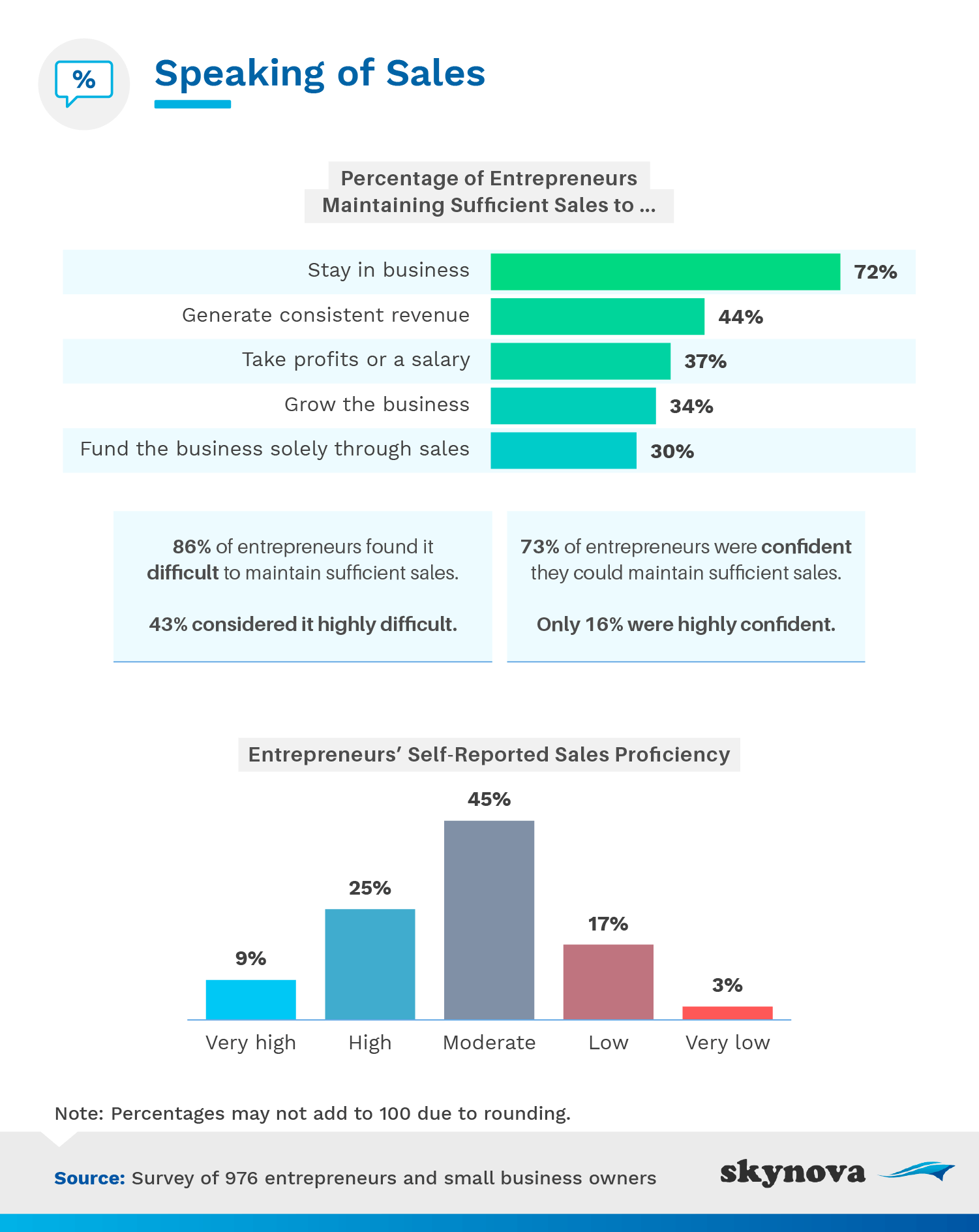
Every business lives or dies on its ability to sell enough at a profitable margin. Fortunately, nearly 3 in 4 (72%) entrepreneurs surveyed were maintaining sufficient sales to keep the ship afloat. Simply staying in business is a huge accomplishment, particularly in the pandemic’s wake and the current economic climate, but few business owners strive to simply get by.
While a majority of entrepreneurs were able to keep the lights on, far fewer had reached successive financial milestones. Less than half (44%) saw consistent revenue, and approximately one-third were earning enough revenue to grow the business.
So, why are small businesses struggling with sales? Simply put: It’s difficult—a fact that 86% of entrepreneurs attested to. In the face of that difficulty, a significant majority (73%) felt confident in their ability to generate the sales their business needed. Entrepreneurship is often a labor of love, perhaps with an emphasis on ‘labor’ for most of our respondents.
Every small business has a sales funnel, whether they know it or not. Simply put, a sales funnel is the journey a potential customer takes that leads to a purchase. The funnel we used for this analysis has three stages: attention and interest, conversions, and retention and reengagement.
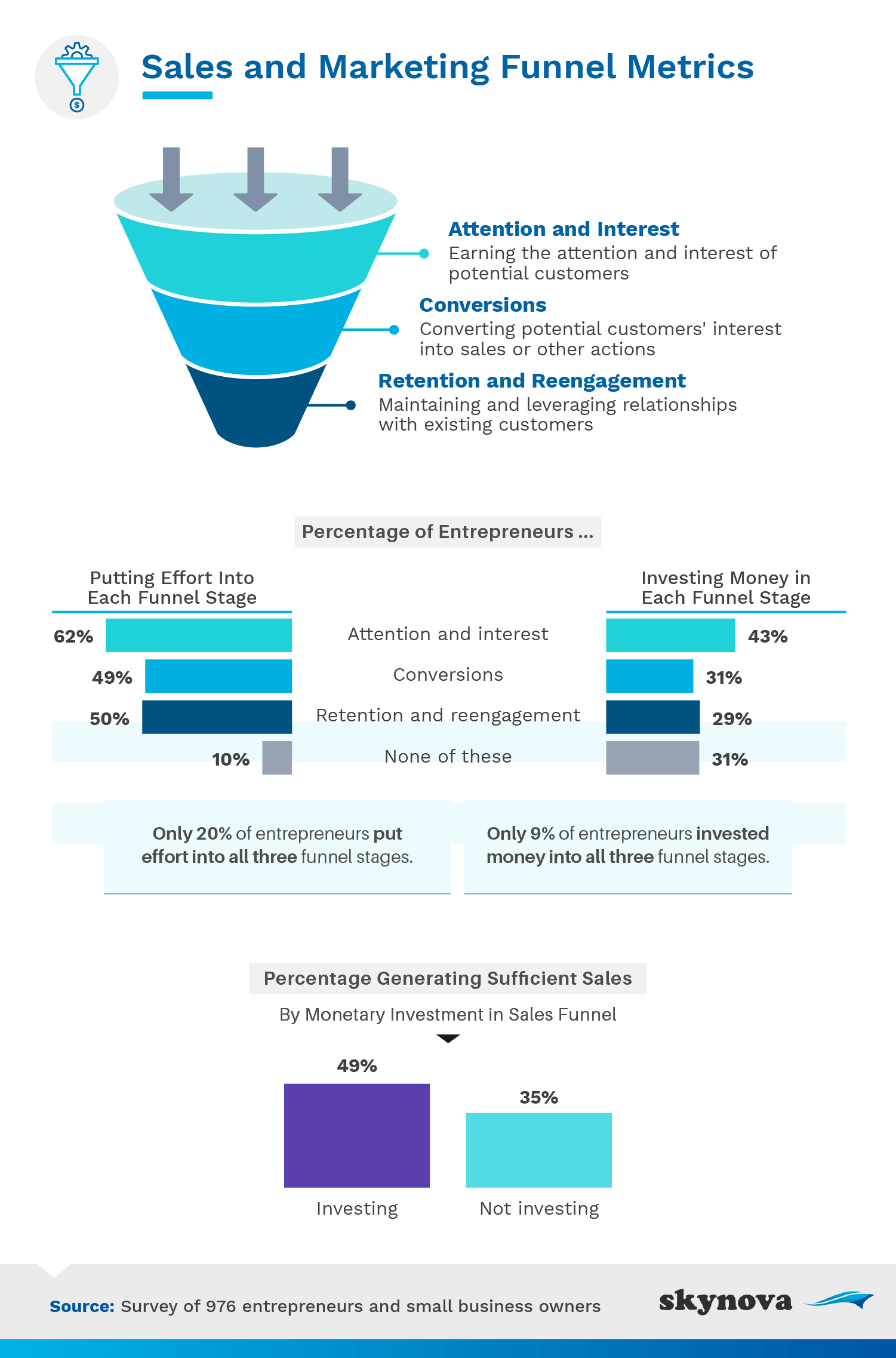
The bulk of our entrepreneurs were putting the most effort and money into stage one, the attention and interest stage. This is likely due to these types of awareness and interest campaigns being the most familiar type of marketing tactic to most people and perhaps the most intuitive to the average entrepreneur.
Conversions, the second stage of our marketing funnel, are absolutely crucial. Attention and interest alone don’t pay the bills, after all. Less than half of small businesses surveyed were putting consistent effort into their conversions, and only 29% were spending money to improve their conversions. When it came to the third step of the funnel, retention and reengagement, businesses allocated a similar amount of time and money as they did to conversions.
The data undoubtedly showed that those who invest their money as well as their effort into the sales funnel were more likely to say they’re generating enough sales. That said, only 20% of entrepreneurs put consistent effort into all three funnel stages, and only 9% were investing capital in all of them.
When competing for the attention of an audience that sees up to 10,000 ads daily, breaking through the noise is challenging to say the least. But with the right tactics, a business can rise above the competition and stand out from the crowd.
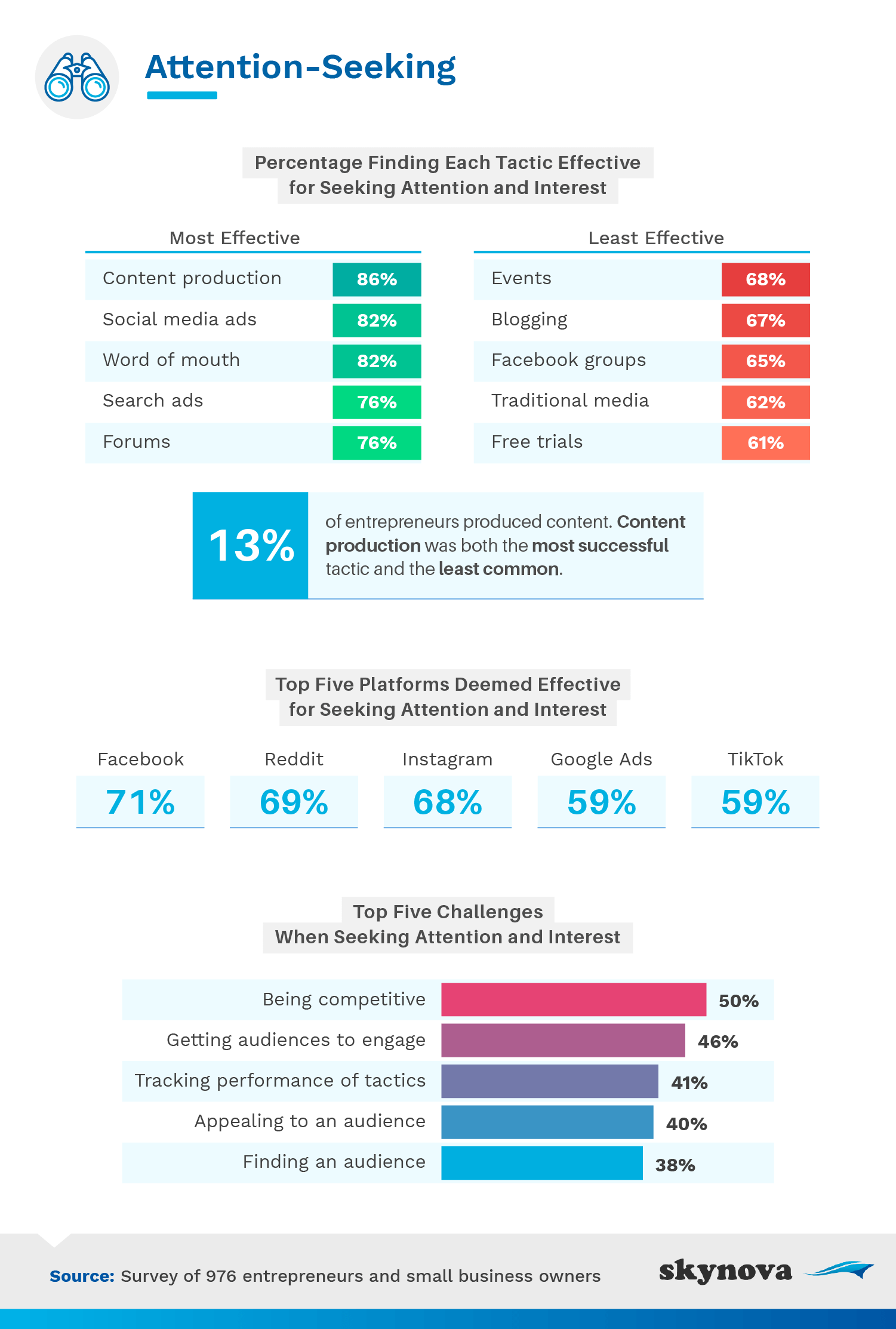
Content production was rated as the most effective tactic for getting the attention of audiences and piquing their interest. However, only 13% of entrepreneurs relied on this successful tactic.
Social media ads and word of mouth were tied as second-most effective, while search ads and forums tied for third. Shockingly enough, more entrepreneurs found social media ads more effective than search ads, even after the recent privacy shakeup with Apple. Word of mouth and search forums may both be effective due to their sources being a real individual that consumers trust. Second-to-least effective was traditional media, which can be more costly and time-consuming than digital media and much less approachable for the average entrepreneur or small-business owner.
According to entrepreneurs, businesses looking to build their brand awareness on social media were still seeing the best results on Facebook. Despite fierce competition from TikTok and a high-profile battle with Apple over user privacy, Facebook is a massive community that entrepreneurs likely shouldn’t overlook. It remains the world’s largest social media platform, and its parent company Meta owns the third-most effective platform on our list, Instagram.
Conversions can often be the most important and most difficult stage of the sales funnel. When it comes to the complexities of conversion, small changes can often lead to a big difference. To learn more, we queried our respondents about which conversion optimization tactics they found effective.
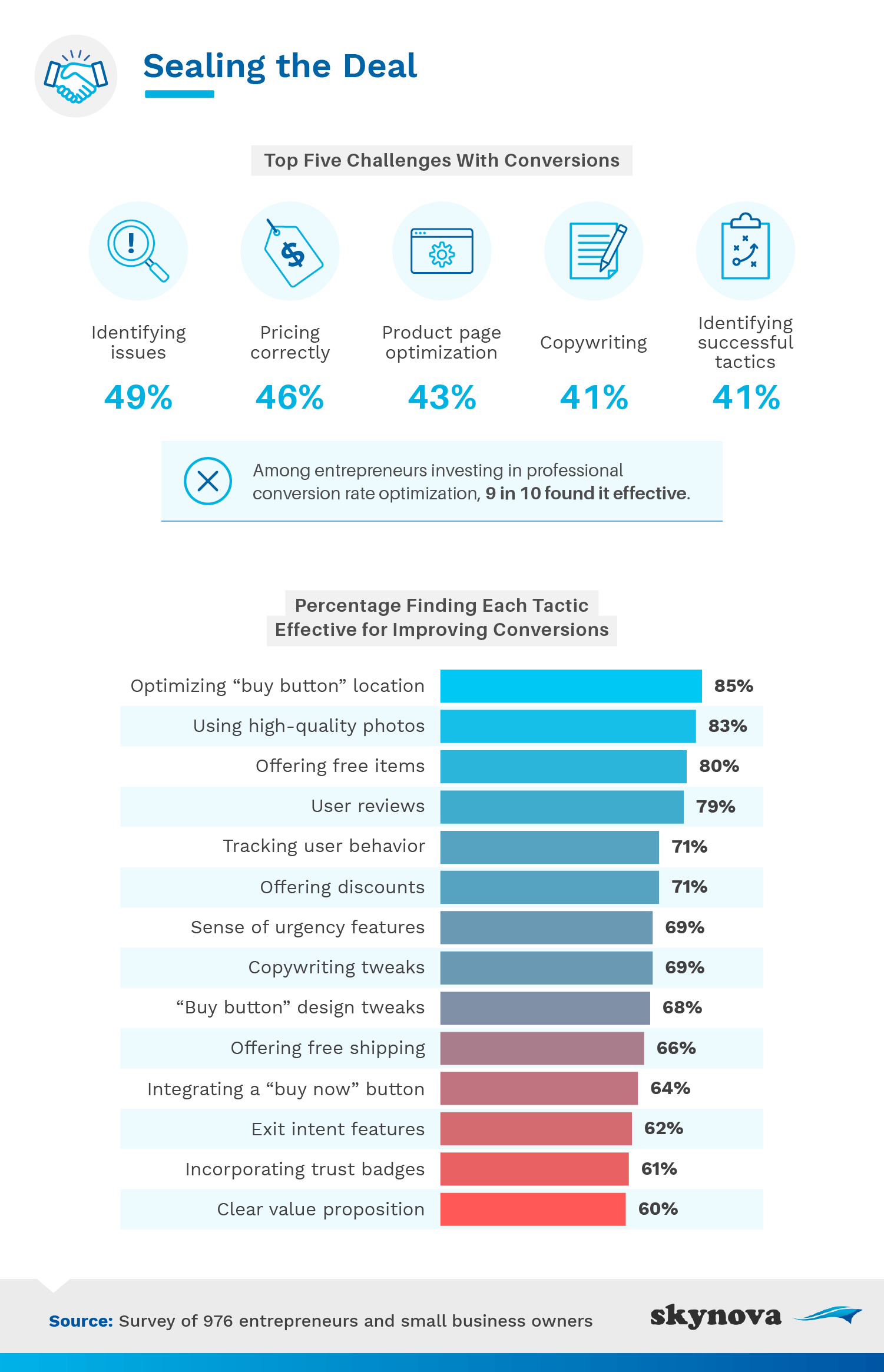
The most common challenge with conversions: identifying your problems in the first place. Almost half of entrepreneurs admitted to struggling to pinpoint the issues they were having with conversions. The factors that influence conversion often can’t be measured directly and require techniques like A/B testing to understand and optimize.
Overall, optimization of the "buy button" location was rated as the most effective tactic for increasing conversions. This may seem obvious, but the importance of a well-placed and effective call to action is difficult to overstate. A well-placed button makes it easy for the consumer to fulfill their desire in that moment.
High-quality photos (the second-most effective tactic) are a must-have for any business, as a study shows nearly 70% of online shoppers say product images are very important when making a purchase decision. Free items, considered an effective tactic by 80% of entrepreneurs who’d tried them, can be a highly effective way to seal the deal. Free items can increase conversions by creating a sense of urgency and by helping customers rationalize their desire as a good deal.
The final stage of the funnel, customer retention and reengagement, is vitally important for a variety of reasons. Existing customers present a great opportunity for recurring business, and they even tend to spend more than new customers. And, since the customer acquisition costs have already been paid, it’s cheaper to retain a customer than convert a new one.
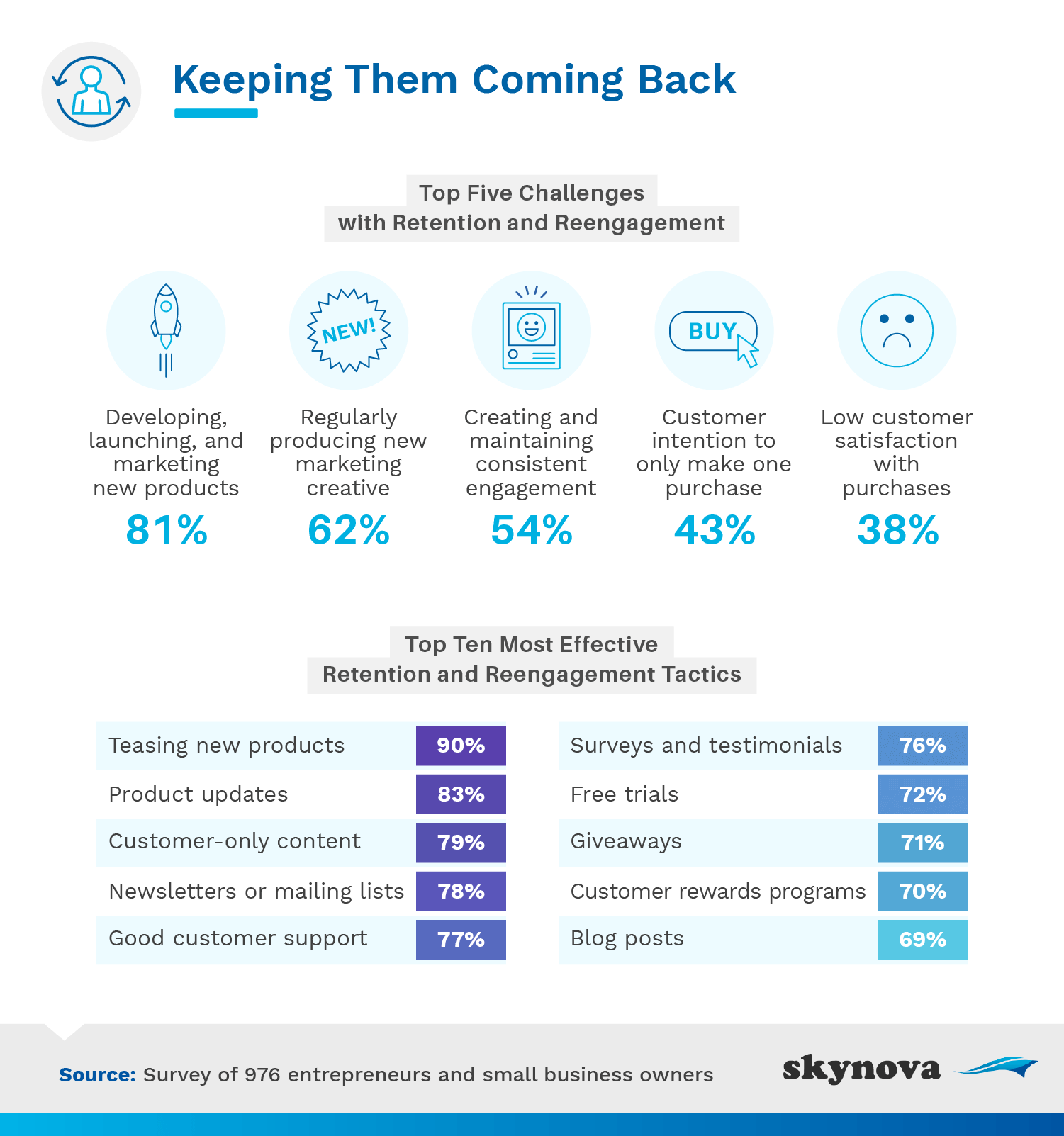
While developing and launching new products was the biggest challenge for entrepreneurs, it was also deemed the most effective in terms of customer retention and reengagement; as 90% of entrepreneurs found it effective to tease new products, and 83% found it effective to update existing products.
Developing new products may be effective, but it isn’t always easy or the right choice for every business. Fortunately, our respondents cited plenty of other effective tactics. Providing exclusive content for customers, using a mailing list or newsletter, and providing great customer support were all great ways to keep customers engaged and involved with a brand.
Running a business is something to be proud of. Entrepreneurship may not be easy, but a majority of respondents were generating enough sales to stay in business—a feat on its own. Most of the entrepreneurs we surveyed, however, were still making progress toward key sales milestones like consistent cash flow and sufficient revenue to grow.
We found that those who invest in their sales funnel are more likely to generate enough sales, and we explored the most effective tactics for each stage in the funnel. Entrepreneurs hoping to increase their sales can turn to a wide range of effective tactics, from content production to "buy button" optimization.
Skynova provides online software for small businesses to help them manage invoices, accounting, time sheets, and more. In addition, we like to write in-depth articles about various topics our customers find interesting. They will generally have a business or workplace angle and often an intersection with another area of society, e.g., business and technology, politics, sports, health. The articles will be based on surveys, statistics, and research conducted by ourselves, something we think might be conducive to finding novel insights or perspectives.
For this analysis, we surveyed 976 entrepreneurs and small-business owners. Among our respondents, 441 were men, 514 were women, 14 identified as nonbinary, and seven preferred not to provide a gender. Our respondents ranged in age from 18 to 76 years old with an average age of 40.
In some cases, questions and answers have been rephrased or paraphrased for clarity or brevity. To help ensure accurate responses, survey respondents were required to correctly answer an attention-check question. These data rely on self-reporting. Potential issues with self-reported data include, but are not limited to, selective memory, attribution errors, and telescoping.
Looking to share our findings with the entrepreneurs or aspiring business owners in your life? That’s fine with us—as long as you leave a link back to our page and are sharing for noncommercial purposes only.